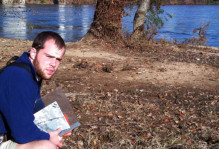Summer research, W&M Style
W&M prides itself on providing undergraduates with meaningful collaborative research experiences with faculty. Indeed, I think that we do undergraduate research better than just about any college or university in the country. Every summer, we have hundreds of W&M students living at no cost (to them, anyway) in our dorms, working with professors on professional quality research. This summer, I had two such “victims” working with me – Nicky Bell and Eric Robinson, both rising sophomores who took my freshman seminar about American political institutions last academic year. Here’s what they did and where the projects will go.
Nicky helped me make sense of a box full of archival records from the personal papers of David Bonior, a former member of the House Democratic leadership from Michigan. Bonior was a key member of the leadership from the late 1980s until 2002 and his congressional papers include all of the whip counts conducted by House Democrats during 1989 – around 60 separate whip polls on the major issues to hit the House floor that year. As past readers of this blog will know, I’ve been conducting research about the whip process, focusing on whip counts, for several years now. Whip counts are private polls conducted by party leaders in which they categorize the positions of their colleagues on upcoming floor votes (yes, no, undecided, and so on). Nicky took the lead in making sense of these voluminous files, sifting through often-conflicting information about the evolving positions of members, entering the results into data sets, and merging in the relevant roll call votes. For the past couple of weeks, we have been analyzing the data together, trying to gauge the ability of congressional leaders to convince their colleagues to toe the party line during what was a pretty critical period of transition in the recent history of Congress. As of now, the plan is for us to coauthor a paper and present it together at a conference in San Francisco in April.
Eric spent much of the summer working with me on an entirely different project. He and I are going to attend a conference together in October at Vanderbilt University in Nashville about the topic of bicameralism, basically the differences that having two separate chambers in a national legislature can make. Our paper will focus on agricultural policy making. For decades, scholars have generally argued that the small-state advantage in the U.S. Senate means that rural areas have disproportionate influence in that chamber as compared to the House. Eric and I are evaluating the extent to which the alleged advantage that rural interests have in the Senate means that agricultural policies emerging from that chamber tilt more strongly toward the interests of farmers (and against consumers) than is the case in the House. If so, then the make-up of the Senate has significant consequences for this important policy area. Among other tasks, Eric took the lead in identifying all of the roll call votes on farm issues cast in the House and Senate since the mid-1990s, singling out for special attention the issues that were voted on in identical form in both chambers. This research strategy allows us to get a precise measure of the relative influence of farm interests in the two chambers. Indeed, we are finding a pro-agriculture bias in the Senate, but it is not anywhere near as large as most scholars would expect.
I’m really pleased and impressed with the work that these students have done this summer. Both of them have been highly professional, hardworking, and creative. They’ve pushed me a lot and I’ve enjoyed working with them. And I hope that the experience has been similarly worthwhile for them. From what I’ve heard, dozens of other W&M faculty and hundred of our students have had similar experiences over the past few months.




No comments.
Comments are currently closed. Comments are closed on all posts older than one year, and for those in our archive.